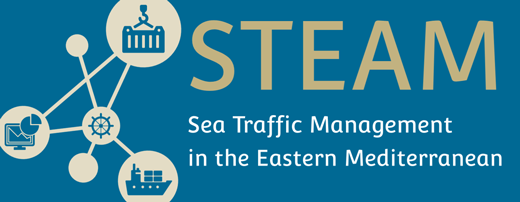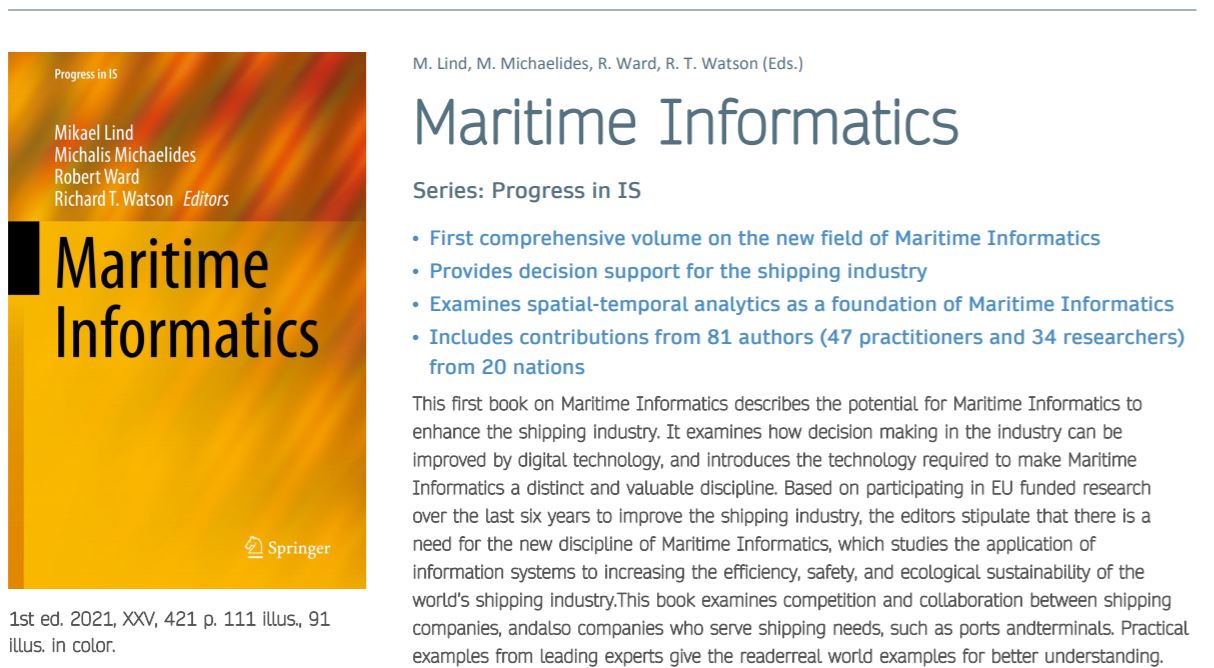Press release: New book release on Maritime Informatics
We are very happy to announce that the first book on Maritime Informatics has just been published by Springer edited by Mikael Lind, Michalis Michaelides, Robert Ward, and Richard Watson.
The book, published by Springer, is to be reached at: www.maritimeinformatics.org
This is the first book issued on Maritime Informatics which describes the potential for Maritime Informatics to enhance the shipping industry. It examines how decision making in the industry can be improved by digital technology and introduces the technology required to make Maritime Informatics a distinct and valuable discipline. It addresses the identified need within the maritime industry for smarter collaboration to enhance operations, satisfy clients’ expectations of transparency and predictability and respond to societal concerns.
Maritime Informatics can be defined as “the application of information systems to increase the efficiency, safety, and ecological sustainability of the world’s shipping industry”. The shipping industry covers 90% of the world seaborne trade movements. Maritime informatics takes a holistic approach to shipping enabling higher levels of transparency, predictability, and visibility of all transport operations connected with shipping. Collaboration within the industry starts with information sharing that can lead to improved efficiency and enhanced operations. Maritime informatics should be on the strategic decision-making agenda for all stakeholders in the shipping sector, because it embraces the full range of competencies needed to improve the energy efficiency and raise the capital productivity of the industry. In addition, it is an evolving science that can be readily harnessed to address emergent problems because it embraces a systems perspective for improving the quality of maritime decision-making, and thus increasing the safety, ecological sustainability, agility and resilience of the world’s shipping industry. By doing so, it can boost the contribution of the maritime sector to the realization of several goals within the United Nations’ 2030 Sustainable Development Agenda.
Maritime Informatics unites practitioners and researchers for their joint efforts in improving the efficiency, sustainability, and resilience of maritime transports. A graduate level course on Maritime Informatics is currently been offered at the Chalmers University of Technology in Sweden and many similar initiatives are currently under way in many other countries across the globe.
The book’s chapters are co-authored by 81 academics and leading practitioners in the shipping industry from 20 nations. Among these are several academics and researchers from the Cyprus University of Technology (CUT) including Sheraz Aslam, Herodotos Herodotou and Michalis Michaelides from the Department of Electrical Engineering, Computer Engineering and Informatics; Stelios Alexandrou and Photis Panayides from the Department of Department of Commerce, Finance and Shipping; leading practitioners from the Cyprus maritime industry including Andreas Chrysostomou (MarineFields), Daniel Hayes (Cyprus Subsea Consulting and Services), Despina Theodossiou (Tototheo Maritime and WISTA), Socrates Theodossiou (Tototheo Maritime), Zacharias Siokouros (CMMI); as well as leading academics and practitioners from the international maritime industry including Trond Andersen (NOFO), Michael Bergman (BM Bergmann-Marine), Albert Gonzalez (Barcelona Port Authority), Mikael Lind (Research Institutes of Sweden (RISE)), and Robert Ward (Hydrographic Advisor). Note that all the aforementioned academics and practitioners are actively involved in the STEAM project either as members of the consortium, or as members of the STEAM Associated Stakeholder Network, or as members of the STEAM Advisory Board.
STEAM (Sea Traffic Management in the Eastern Mediterranean) is a three-year project that has started in Jan. 2019 with a budget of approximately one million EUR and coordinated by the Cyprus University of Technology (CUT). The primary goal of STEAM is to develop the Port of Limassol to become a world-class transshipment and information hub adopting modern digital technologies brought to the maritime sector, as well as a driver for short sea shipping in the Eastern Mediterranean.
To keep updated on the developments of maritime informatics visit the website at www.maritimeinformatics.org or join the LinkedIn group of maritime informatics at https://www.linkedin.com/groups/12477137/
For more information on the STEAM project, please see https://steam.cut.ac.cy/
Contact: Michalis Michaelides, Assistant Professor, Department of Electrical and Computer Engineering and Informatics (michalis.michaelides@cut.ac.cy )

